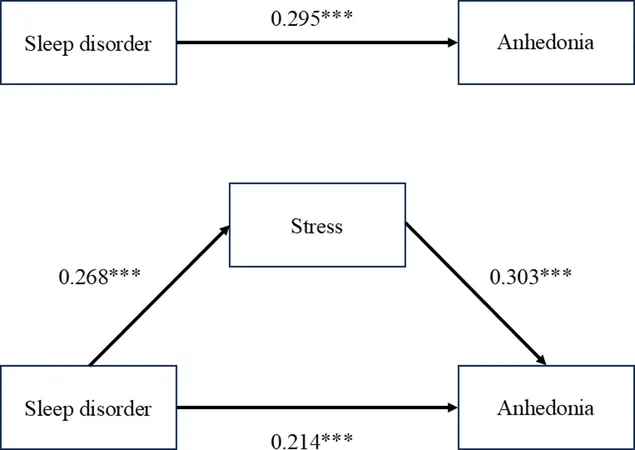
The Hidden Link Between Sleep Disorders and Anhedonia in Adolescents with Major Depressive Disorder: How Stress Plays a Role
2024-12-31
Author: Arjun
Adolescent Major Depressive Disorder (adMDD) is emerging as a major public health issue, affecting an estimated 16.9% of adolescents in the United States alone. Research reveals that depression onset during adolescence is more likely to be inherited than that of earlier ages, and more recurrent compared to adult-onset depression. Symptoms of adMDD often include emotion dysregulation, cognitive dysfunction, and behavioral issues, leading to severe social and educational challenges.
One of the core symptoms of MDD is anhedonia—the reduced ability to experience pleasure or diminished interest in previously enjoyed activities. In adolescents grappling with MDD, the severity of anhedonia is directly correlated with overall depression severity, prolonged depressive episodes, and frequent recurrences. Alarmingly, adolescents with significant anhedonia face a heightened risk of non-suicidal self-injury and suicidal ideation. Current treatment approaches with antidepressants show diminished efficacy for those suffering from anhedonia, underscoring the urgency to identify effective interventions to alleviate this debilitating symptom.
There's mounting evidence illustrating a robust relationship between sleep quality and levels of positive affect. Sleep disorders are prevalent in individuals with MDD, with over 90% of patients reporting difficulty sleeping—be it insomnia, frequent awakenings, or waking up too early. Alarmingly, a significant decline in the number of adolescents receiving adequate sleep is observed, with less than 40% getting more than seven hours a night over the past couple of decades.
A critical aspect missing from the dialogue around adMDD is the interaction between sleep disorders and stress. Stress contributes profoundly to internalizing symptoms in adolescents, with family stress, peer victimization, and parental conflict being the primary social stressors affecting sleep quality and duration. Understanding this relationship is vital, as the perception of stress can compromise sleep health and impact overall well-being.
Research has consistently demonstrated that perceived stress could influence anhedonia, particularly during psychotherapy. High stress levels lead to worse outcomes in reward processing, an essential component for experiencing pleasure. Inflammation response linked to stress may significantly disrupt reward-related functions, further exacerbating anhedonia.
In light of these complexities, a recent cross-sectional study involving 200 adolescents diagnosed with adMDD sought to explore these relationships. The study aimed to investigate how sleep disorders influence anhedonia, and how stress functions as a mediating factor. Key hypotheses included: 1. Sleep disorders contribute to increased anhedonia levels. 2. Stress levels are exacerbated by sleep disorders. 3. Anhedonia is influenced by the presence of stress.
Participants were carefully selected and completed a series of validated questionnaires assessing anhedonia, sleep quality, and stress levels. Results indicated a stark correlation where sleep disorders could heighten feelings of anhedonia through increased stress levels. Notably, stress was shown to partially mediate the relationship between sleep disorders and anhedonia.
As the study highlights, adolescents suffering from sleep disturbances are more susceptible to stress, even from seemingly trivial experiences. Prolonged experiences of feeling overwhelmed can lead to withdrawal from social activities—further isolating these individuals and intensifying feelings of anhedonia.
While the findings shed light on the intricate relationship shared between sleep, stress, and anhedonia, the study acknowledges certain limitations, such as its cross-sectional design and reliance on self-reported data. Future studies are encouraged to explore longitudinal designs and potentially utilize polysomnography to garner more objective data about sleep and its impact on mood disorders.
Ultimately, addressing sleep disorders should be a pivotal part of treating adMDD in adolescents. Intervention programs targeting sleep hygiene could serve as powerful tools in enhancing the overall psychological resilience of young individuals battling depression. Recognizing the multifaceted nature of sleep, stress, and depression could pave the way for better therapeutic methodologies, reducing the burden of mental health disorders among adolescents.
 Brasil (PT)
Brasil (PT)
 Canada (EN)
Canada (EN)
 Chile (ES)
Chile (ES)
 Česko (CS)
Česko (CS)
 대한민국 (KO)
대한민국 (KO)
 España (ES)
España (ES)
 France (FR)
France (FR)
 Hong Kong (EN)
Hong Kong (EN)
 Italia (IT)
Italia (IT)
 日本 (JA)
日本 (JA)
 Magyarország (HU)
Magyarország (HU)
 Norge (NO)
Norge (NO)
 Polska (PL)
Polska (PL)
 Schweiz (DE)
Schweiz (DE)
 Singapore (EN)
Singapore (EN)
 Sverige (SV)
Sverige (SV)
 Suomi (FI)
Suomi (FI)
 Türkiye (TR)
Türkiye (TR)
 الإمارات العربية المتحدة (AR)
الإمارات العربية المتحدة (AR)